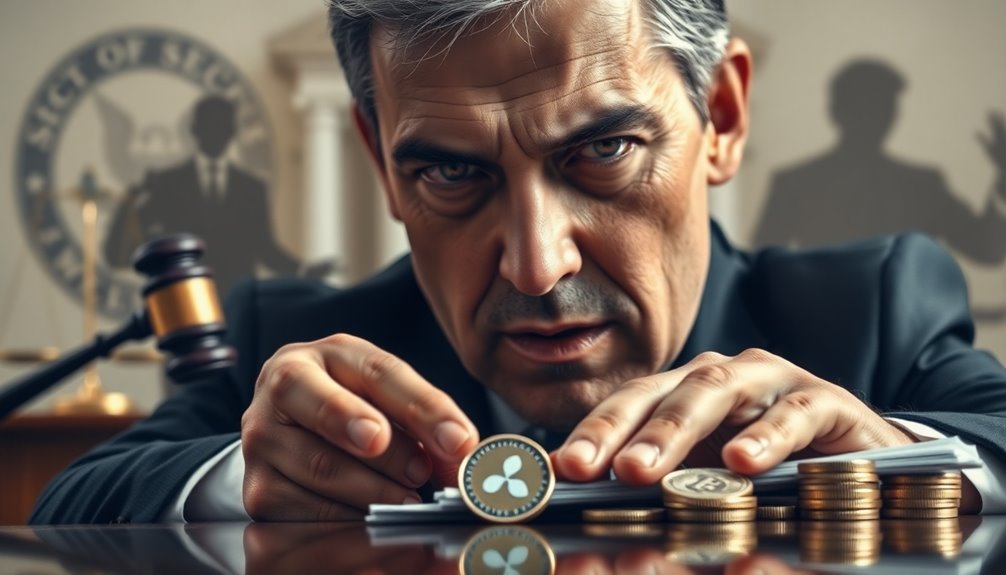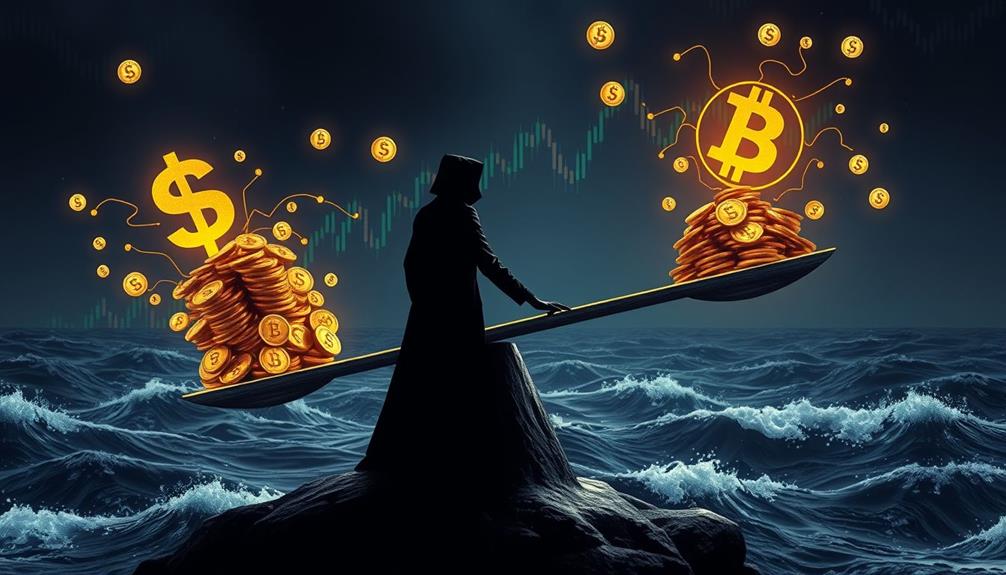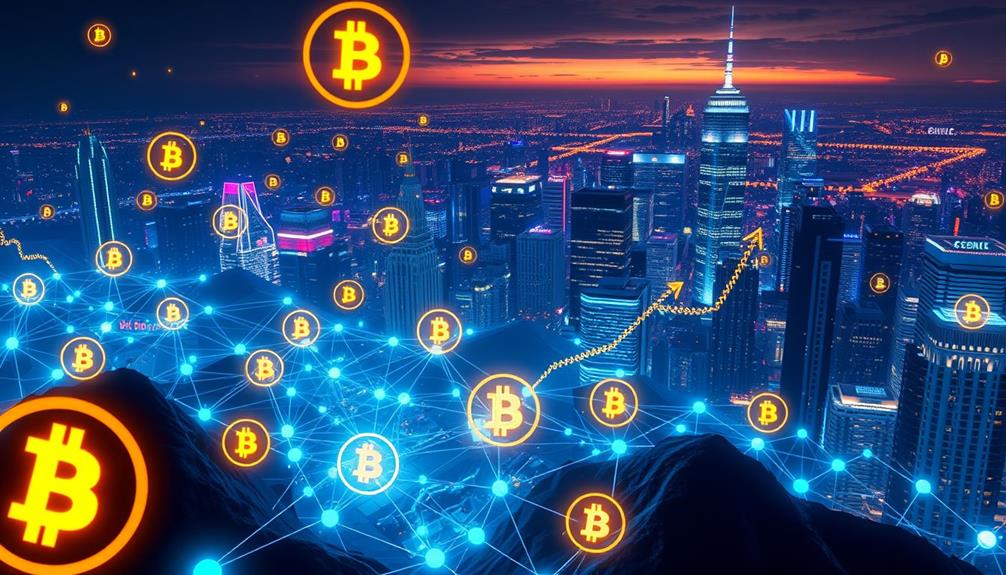John Deaton highlights how the SEC's aggressive tactics align with competitors aiming to weaken Ripple's standing. The SEC claims Ripple sold XRP as an unregistered security, creating turbulence for the cryptocurrency. With major exchanges delisting XRP and institutional sales facing penalties, rival companies like Stellar capitalize on this uncertainty. Deaton emphasizes the need for regulatory clarity to protect XRP holders and reshape the market dynamics. As community support grows against regulatory overreach, the battle continues. You'll discover deeper insights into these dynamics and their implications for Ripple and the broader cryptocurrency landscape.
Key Takeaways
- John Deaton has rallied 75,000 XRP holders against perceived regulatory overreach by the SEC, highlighting a collective defense strategy.
- Deaton argues that the SEC's actions against Ripple are influenced by connections with competitors like Ethereum, raising concerns of bias.
- The SEC's lawsuit against Ripple has created a competitive advantage for rivals, such as Stellar, benefiting from Ripple's ongoing legal troubles.
- Ripple's legal challenges may be seen as a tactic to stifle innovation in the cryptocurrency space, impacting market dynamics broadly.
- Deaton emphasizes the need for clear regulations to protect the interests of XRP holders and ensure fair competition in the crypto market.
Overview of the SEC Lawsuit
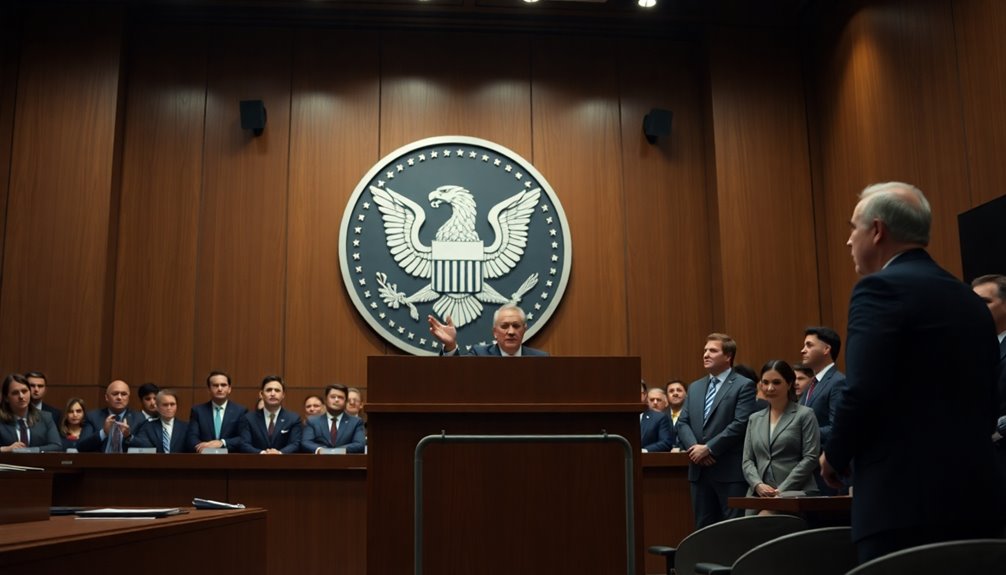
The SEC lawsuit against Ripple has become a pivotal moment in the cryptocurrency landscape, sparking intense debate and scrutiny.
The SEC alleges that Ripple sold XRP as an unregistered security, raising over $1.3 billion since 2013. They targeted Ripple and its executives, claiming the company created an "information vacuum" by selectively sharing details.
Ripple's defense argues that XRP isn't a security, emphasizing its utility in cross-border payments and citing international recognition of its status. They contend the SEC was aware of XRP's legal standing through past communications and assert that the complaint is overly broad. Additionally, the court's verdict revealed that XRP is not classified as a security when sold on exchanges, which could have far-reaching implications for the crypto industry.
This lawsuit has significantly impacted Ripple's operations and raised concerns about regulatory overreach within the cryptocurrency sector.
Court Rulings on XRP

While the court rulings on XRP have brought some clarity to the ongoing legal battle, they also underscore a complex landscape for Ripple and the cryptocurrency market.
Judge Analisa Torres ruled that XRP tokens aren't securities when sold to retail investors, marking a partial victory for Ripple. However, she deemed institutional sales as unregistered securities offerings. This distinction complicates the narrative, as the SEC argues these sales threaten investor protection.
Interestingly, the court denied the SEC's $876 million disgorgement request, citing no evidence of investor harm. This ruling signals a potential shift in how courts may view SEC enforcement actions, with implications for future cryptocurrency regulations and investor confidence in the market. Additionally, the SEC's appeal may further complicate Ripple's legal battles and the broader regulatory framework for cryptocurrencies.
Ripple's Financial Penalties

Ripple faces a significant financial penalty of $125,035,150, reflecting the court's decision on its institutional sales of XRP. This amount falls far below the SEC's initial demand of nearly $2 billion and Ripple's own proposal of $10 million.
The penalty pertains specifically to 1,278 transactions deemed unregistered securities offerings under Section 5 of the Securities Act. Notably, the court didn't find evidence of fraud or other culpable conduct, which contributed to the reduced penalty. Additionally, the SEC's requests for disgorgement and prejudgment interest were denied. Ripple is now required to cease further violations of securities laws, particularly concerning its On-Demand Liquidity service, to avoid incurring future penalties. Furthermore, the court's ruling emphasizes the distinction between different types of XRP sales, highlighting the need for Ripple to adapt its operational strategies in light of potential future regulations.
Compliance is essential moving forward.
Impact on XRP's Market Value
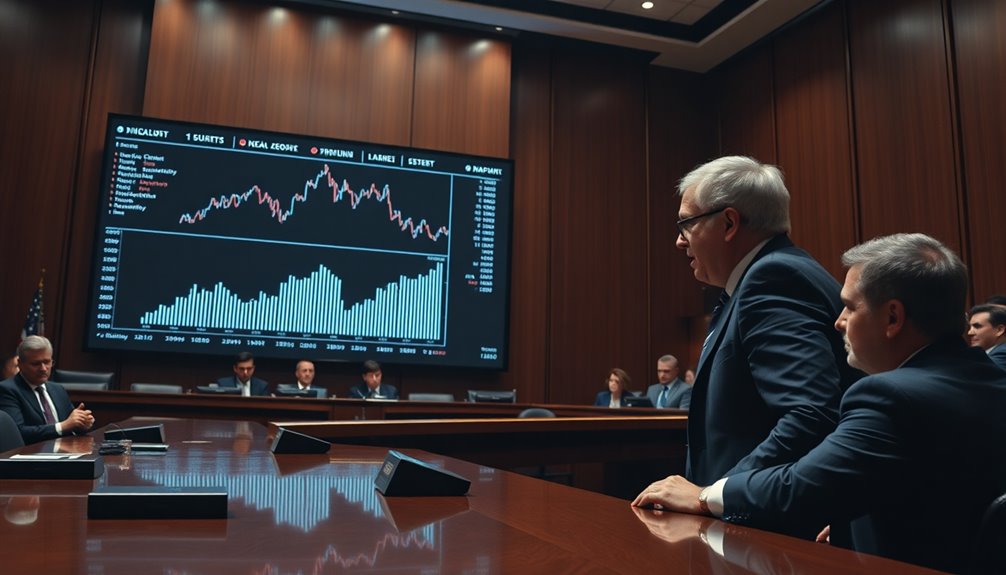
XRP's market value has been significantly impacted by various legal developments and regulatory challenges. Following the SEC's charges in December 2020, XRP's price plummeted from $0.50 to $0.17, a staggering 66% drop due to the uncertainty surrounding the lawsuit.
This decline also led to XRP's removal from several trading platforms, further eroding its value. On July 13, 2023, a favorable ruling declared XRP isn't a security, momentarily boosting its market value, but ongoing appeals have kept investors on edge. Many analysts believe a favorable resolution could ignite a surge, potentially raising XRP's price by 66%. Furthermore, the SEC filed an appeal on October 17, 2024, which adds to the legal uncertainty. However, the persistent legal uncertainty continues to challenge investor confidence and market stability, making XRP a high-risk investment.
Competitors Capitalizing on Uncertainty

Numerous competitors are seizing the opportunity presented by the ongoing legal uncertainty surrounding Ripple. Companies like Stellar (XLM) have stepped in, with MoneyGram switching from XRP to XLM, reflecting a strategic move to capitalize on Ripple's challenges. This shift highlights how competitors are attracting investors and users who once backed XRP. The SEC's broad complaint against Ripple has created an environment where others can thrive, gaining an unfair regulatory advantage. Former SEC officials have been linked to Ethereum, raising questions about impartiality and enabling competitors to position themselves favorably. As Ripple faces legal hurdles, the cross-border payments market remains attractive, allowing these rivals to expand their presence and capture market share that Ripple may lose. With the global cross-border payments market valued at over $150 trillion in 2022, the stakes for these competitors have never been higher.
Community Support for Ripple

In the face of ongoing legal challenges, the community's support for Ripple remains strong. You might notice that while trust in Ripple scores a moderate 3.68 out of 5, sentiments about its XRP holdings hover around 3.39. Establishing clear co-parenting rules can be beneficial for maintaining stability and unity among supporters.
Many of you express a desire for more influence, with 47.2% wanting significant community input in XRPL development. Transparency and decentralization are key values driving this engagement. Additionally, a significant portion of the community, 87.1% aware, recognizes the importance of the positive legal rulings regarding XRP, and 72.7% oppose the proposed $125 million fine.
Despite feeling misled by some announcements, 87.1% are aware of the positive legal rulings regarding XRP, and 72.7% oppose the proposed $125 million fine.
With 75,000 XRP holders uniting against the SEC, it's clear that the community stands firm in protecting both Ripple and the broader crypto landscape from regulatory overreach.
John Deaton's Perspective

John Deaton, a prominent attorney advocating for XRP holders, has been vocal about the SEC's approach to regulating cryptocurrencies.
He argues that the SEC's methods reflect outdated laws from 1933, failing to accommodate modern technologies like blockchain. Deaton criticizes potential conflicts of interest, especially with former SEC officials who benefited financially from Ethereum's rise. He calls for significant reform, including replacing the crypto unit with a general fraud unit and clarifying the SEC's jurisdiction over DeFi and self-custody. Deaton supports Brad Bondi as a suitable SEC Chair candidate, emphasizing the need for leadership that aligns with innovation. His perspective underscores the urgent need for a regulatory framework that fosters growth rather than stifles it. Additionally, he highlights how regulatory capture can undermine the fairness of market operations, further complicating the landscape for emerging technologies like XRP.
Broader Regulatory Implications
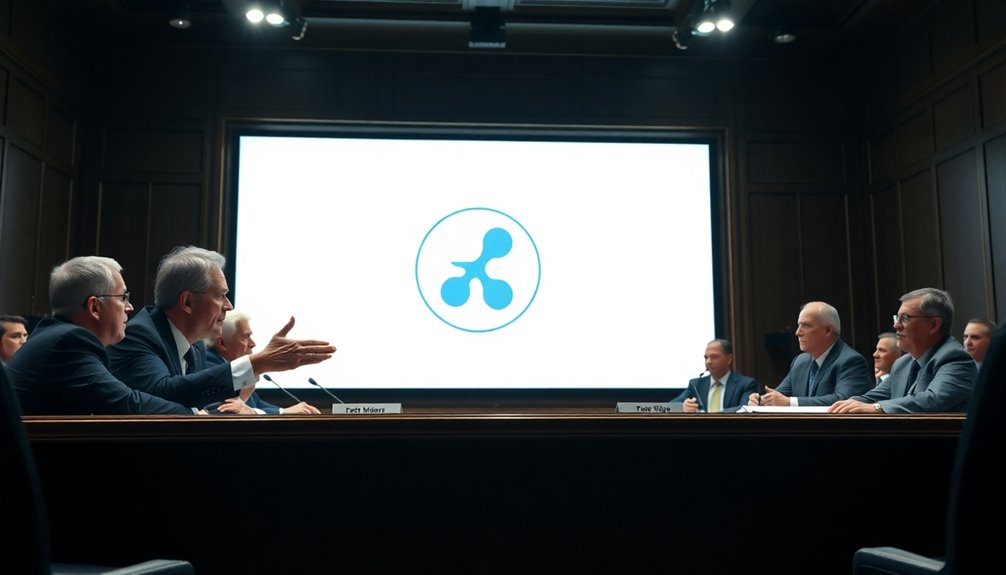
Broader regulatory implications for the cryptocurrency sector are becoming increasingly evident as lawmakers recognize the need for clarity and consistency in governance.
The introduction of bipartisan bills like the Responsible Financial Innovation Act aims to create a solid regulatory framework for digital assets. States are tightening regulations, requiring money transmitter licenses and adherence to blue sky laws, underscoring the necessity for compliance. Additionally, the anticipated implementation of Markets in Crypto-Assets Regulations by December 30, 2025, will further influence how cryptocurrencies are governed.
As cryptocurrencies intertwine with traditional finance, global coordination is crucial to mitigate risks. The SEC's aggressive stance, particularly against Ripple, signals a shift in enforcement that could shape future regulations.
Future of Ripple and XRP

The future of Ripple and XRP hinges on the outcome of the ongoing legal battle with the SEC, which has created a volatile environment for investors and stakeholders.
The SEC's claims that XRP is a security have led to significant market uncertainty, prompting exchanges like Coinbase to delist XRP and MoneyGram to pivot to XLM. However, international recognition of XRP as a non-security by countries like Japan and Switzerland offers hope. This recognition is crucial as it contrasts with the SEC's stance and demonstrates that many jurisdictions consider XRP to be a non-security token.
Analysts project that XRP could trade between $1.35 and $2.12 by early 2025, with potential for higher prices if institutional adoption increases. John Deaton's advocacy has rallied 75,000 XRP holders, emphasizing the fight against regulatory overreach, which could ultimately shape the future of Ripple and XRP in the crypto landscape.
Frequently Asked Questions
How Did the Sec's Lawsuit Against Ripple Start?
The SEC’s lawsuit against Ripple started on December 22, 2020, when it filed an action against Ripple Labs and its executives, Christian Larsen and Bradley Garlinghouse. The lawsuit alleges that Ripple raised over $1. 3 billion through an unregistered, ongoing digital asset securities offering using XRP. In response to the lawsuit, Ripple CEO Brad Garlinghouse stated in a Ripple CEO interview, “We are going to be on the right side of history. We feel very good about the position the company has, and we are going to defend our position.
The SEC alleged they conducted an unregistered digital asset securities offering, raising over $1.3 billion through XRP sales.
They claimed Ripple failed to register XRP or meet exemptions, violating securities laws.
This lawsuit sparked significant market reactions and raised questions about the regulation of digital assets.
What Are the Key Arguments From Ripple's Defense?
Ripple's defense hinges on several key arguments.
You'll see them emphasize that their financial condition shouldn't factor into decisions about historical penalties. They argue past contracts remain sensitive and irrelevant to current sales methods.
Ripple also contests the SEC's public disclosure claims about XRP, asserting that historical contracts aren't governed by securities law.
Finally, they assert that the SEC's requests for financial information are untimely and don't impact the court's remedy considerations.
How Is Xrp's Technology Different From Competitors?
XRP's technology stands out due to its focus on financial institutions and a centralized approach that fosters trust and compliance.
You'll find its XRP Ledger offers speedy, energy-efficient transactions, unlike many competitors. It also aims for interoperability and scalability, making it versatile for various financial applications.
Additionally, by integrating with RippleNet, XRP addresses liquidity issues in cross-border payments, setting it apart from decentralized rivals like Stellar and Ethereum.
What Potential Outcomes Could Arise From the Sec's Appeal?
The SEC's appeal could lead to several potential outcomes that directly impact you as an XRP holder.
It might uphold or overturn Judge Torres's decision on XRP's status, affecting its market value. A permanent injunction could limit Ripple's operations, while changes to penalties might influence Ripple's financial stability.
Additionally, the resolution could set regulatory precedents, impacting not just Ripple, but the entire crypto market, influencing your investment confidence and future decisions.
How Can Investors Support Ripple During This Legal Battle?
You can support Ripple during this legal battle by staying informed about the case and its implications for the crypto industry.
Joining community efforts, like those organized by XRP holders, helps amplify your voice.
Consider investing in XRP to show confidence, and engage in discussions to raise public awareness.
Supporting legal advocacy initiatives will also protect your interests as an investor, ensuring the cryptocurrency space evolves positively despite challenges.
Conclusion
In the ongoing battle against the SEC, Ripple's resilience shines through, bolstered by community support and John Deaton's insights. As competitors take advantage of the uncertainty surrounding XRP, it's crucial to stay informed about court rulings and regulatory implications. The future of Ripple and XRP remains uncertain, but the continued fight for clarity in the crypto space will ultimately shape its trajectory. You've got a front-row seat to witness this pivotal moment in cryptocurrency history.
